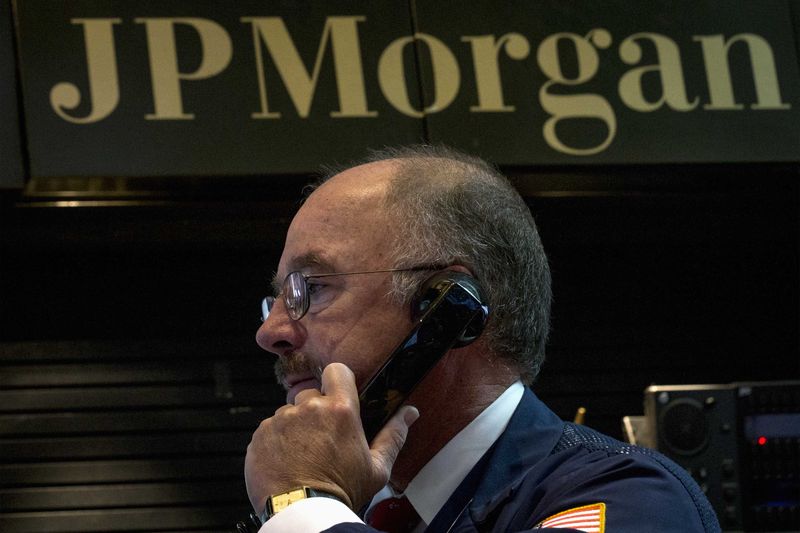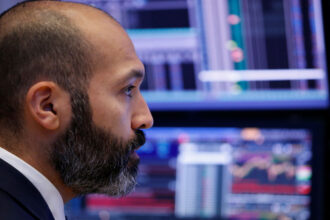© Reuters. FILE PHOTO: JPMorgan Chase CEO Jamie Dimon talks to reporters as he leaves the U.S. Capitol after an unannounced meeting with U.S. Senate Majority Leader Schumer that was reportedly about the possibility of the U.S. defaulting on its debt, outside the U.S
By Niket Nishant, Lananh Nguyen and Nupur Anand
(Reuters) -JPMorgan Chase Chief Executive Officer Jamie Dimon will sell some of his shares in the largest U.S. bank next year for the first time in almost 18 years at the helm, the bank said on Friday, sending the stock down more than 3%.
Billionaire Dimon will sell the stock for “financial diversification and tax-planning purposes,” and “continues to believe the company’s prospects are very strong,” the bank said in a filing. Dimon and his family intend to sell 1 million of their 8.6 million shares, according to the filing. That is a tiny percentage of the shares outstanding in JPMorgan which has a market capitalization exceeding $409 billion, according to LSEG data.
Dimon, one of the most prominent voices in corporate America, steered JPMorgan through the 2008 financial crisis. He was also integral in the rescue of First Republic Bank (OTC:) this year which helped quell turmoil fueled by the collapse of several regional banks.
The stock sale “makes perfect sense” given Dimon’s wealth is so concentrated in his company’s stock, said Octavio Marenzi, chief executive of Opimas, a management consultant focused on capital markets. Still, investors can view such moves as a bad sign.
“In his rhetoric, he has become more negative and quite bearish,” Marenzi said. “It doesn’t look good, but they’re massaging the optics as best they can.”
Dimon warned in October that “this may be the most dangerous time the world has seen in decades.” Still, the bank reported a 35% jump in profits.
The 67-year-old bank chief has an estimated net worth of $1.7 billion, according to Forbes.
The sale is not related to leadership succession, a company spokesman said. Dimon has no current plans to sell more stock, but could consider doing so in the future, the spokesman added.
In May, the CEO signaled he could depart in 3-1/2 years.
Several executives who were viewed as potential successors to run JPMorgan have left to run other companies as Dimon stayed longer than expected.
The share sale would fetch nearly $141 million, with a remaining stake of about $1.07 billion, based on Thursday’s closing price. It will account for less than 10% of Dimon’s holdings, which also include performance shares that have not vested and stock appreciation rights.
Shares of JPMorgan slid more than 3%, falling with peers Bank of America, Citigroup and Wells Fargo.
“Typically, CEOs or insiders selling stock sparks concern, but not in this case, as the bank’s balance sheet remains in a strong position,” said Brian Mulberry, client portfolio manager at Zacks Investment Management, which holds JPMorgan stock.
“We are not concerned on the timing or the motive behind this,” Mulberry said, adding Zacks would not sell any shares after the announcement.
The move was not seen as an expression of Dimon’s view on the stock price, “unless he displays opportunistic selling behavior by, among other things, targeting specific prices,” said Ben Silverman, director of research at VerityData, an investment research firm that tracks insider activity.
“This is a reminder that the CEO is getting closer to retirement, he has 3.5 years left on his 5-year plan as CEO,” Mike Mayo, an analyst at Wells Fargo said in a note on Friday.
Succession plans of Wall Street giants have come into focus after James Gorman announced plans to hand over the reins at Morgan Stanley and Peter Orszag became CEO at Lazard (NYSE:) earlier this month.
“There is not enough evidence that Dimon is going to stop being the CEO any time soon but this sale highlights discussions around succession considering it is his first sale since being at the helm,” said Dave Ellison, a portfolio manager at Hennessy Funds which holds JPMorgan stocks.
So far this year, JPMorgan shares have risen 1.4%, outperforming the Banks Index, which has declined 18%.
The news could trigger some short-term weakness in the stock, but “it does not alter our thinking,” said Scott Siefers, an analyst at Piper Sandler who has an “overweight” rating on the bank. JPMorgan has a very strong capital, liquidity and risk profile, Siefers wrote in a note.
Read the full article here










